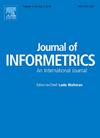Hyperprolific authorship: Unveiling the extent of extreme publishing in the ‘publish or perish’ era
IF 3.5
2区 管理学
Q2 COMPUTER SCIENCE, INTERDISCIPLINARY APPLICATIONS
引用次数: 0
Abstract
The increasing pressure of the “publish or perish” academic culture has contributed to the rise of hyperprolific authors—researchers who produce an exceptionally high number of publications. This study investigates the global phenomenon of hyperprolific authorship by analyzing the bibliometric data of over two million scholars across various disciplines from 2017 to 2019. Using field-specific thresholds to identify hyperprolific authors, we explore their geographic and disciplinary distributions, the impact of their publications, and their collaboration patterns. The results reveal that hyperprolific authors are concentrated in fields such as Clinical Medicine, Biomedical Research, and Chemistry, and in countries with substantial research investments, including China, the United States, and Germany. Contrary to concerns about a trade-off between quantity and quality, hyperprolific authors tend to produce higher-impact publications on average compared to their peers. Their output is strongly associated with extensive co-authorship networks, reflecting the role of collaboration in enabling prolific publishing. The findings underscore the need for balanced evaluation metrics that prioritize both quality and integrity in academic publishing. This study contributes to understanding the drivers and consequences of hyperprolific behavior, offering insights for research policy and evaluation practices.
超级多产作者:揭示“出版或灭亡”时代极端出版的程度
“要么发表,要么灭亡”的学术文化的压力越来越大,这促成了高产作者——发表了大量论文的研究人员——的崛起。本研究通过分析2017年至2019年200多万名不同学科学者的文献计量数据,探讨了全球超级高产作者现象。使用特定领域的阈值来识别高产作者,我们探索了他们的地理和学科分布,他们的出版物的影响,以及他们的合作模式。结果显示,高产作者集中在临床医学、生物医学研究和化学等领域,以及在研究投资大量的国家,包括中国、美国和德国。与对数量和质量之间权衡的担忧相反,与同行相比,高产作者通常会发表更有影响力的文章。它们的产出与广泛的合著网络密切相关,反映了协作在实现多产出版方面的作用。研究结果强调了在学术出版中需要平衡的评估指标,优先考虑质量和诚信。本研究有助于理解高产行为的驱动因素和后果,为研究政策和评估实践提供见解。
本文章由计算机程序翻译,如有差异,请以英文原文为准。
求助全文
约1分钟内获得全文
求助全文
来源期刊

Journal of Informetrics
Social Sciences-Library and Information Sciences
CiteScore
6.40
自引率
16.20%
发文量
95
期刊介绍:
Journal of Informetrics (JOI) publishes rigorous high-quality research on quantitative aspects of information science. The main focus of the journal is on topics in bibliometrics, scientometrics, webometrics, patentometrics, altmetrics and research evaluation. Contributions studying informetric problems using methods from other quantitative fields, such as mathematics, statistics, computer science, economics and econometrics, and network science, are especially encouraged. JOI publishes both theoretical and empirical work. In general, case studies, for instance a bibliometric analysis focusing on a specific research field or a specific country, are not considered suitable for publication in JOI, unless they contain innovative methodological elements.
 求助内容:
求助内容: 应助结果提醒方式:
应助结果提醒方式:


